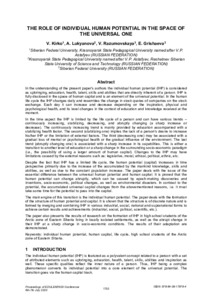THE ROLE OF INDIVIDUAL HUMAN POTENTIAL IN THE SPACE OF THE UNIVERSAL ONE
Скачать файл:
URI (для ссылок/цитирований):
https://iated.org/edulearn/https://elib.sfu-kras.ru/handle/2311/142854
Автор:
Kirko, V.
Lukyanova, A.
Razumovskaya, V.
Grishaeva, E.
Коллективный автор:
Институт экономики, управления и природопользования
Кафедра делового иностранного языка
Дата:
2020Журнал:
Proceedings of EDULEARN20 Conference 6th-7th July 2020Квартиль журнала в Web of Science:
без квартиляБиблиографическое описание:
Kirko, V. THE ROLE OF INDIVIDUAL HUMAN POTENTIAL IN THE SPACE OF THE UNIVERSAL ONE [Текст] / V. Kirko, A. Lukyanova, V. Razumovskaya, E. Grishaeva // Proceedings of EDULEARN20 Conference 6th-7th July 2020. — 2020. — С. 1755-1759Аннотация:
In the understanding of the present paper’s authors the individual human potential (IHP) is considered as upbringing, education, health, talent, skills and abilities that are directly inherent of a person. IHP is fully disclosed in the space of human capital and is an element of the universal potential. In the human life cycle the IHP changes daily and resembles the change in stock quotes of companies on the stock exchange. Each day it can increase and decrease depending on the inspiration, physical and psychological health, and its level changes in the context of education and knowledge received at the moment. In the time aspect the IHP is limited by the life cycle of a person and can have various trends – continuously increasing, stabilizing, decreasing, and abruptly changing (a sharp increase or decrease). The continuously increasing trend is mainly provided by education accompanied with a stabilizing health factor. The second (stabilizing one) implies the lack of a person’s desire to increase his/her IHP or the limitation of external factors. The third (decreasing one) may be associated with a gradual loss of mental or psychological health or the gradual influence of the environment. The last trend (abruptly changing one) is associated with a sharp increase in its capabilities. This is either a transition to another level of education or a sharp change in the surrounding socio-economic paradigm (i.e., the possibility of using a larger amount of human capital). Changes to the IHP may have limitations caused by the external reasons such as: legislative, moral, ethical, political, ethnic, etc. Despite the fact that IHP has a limited life cycle, the human potential (capital) increases in time perspective primarily due to the increase of the accumulated by the mankind knowledge, skills and abilities, as well as due to the constant population increase. The paper deals with the issue of the essential difference between the universal human potential and human capital. It is proved that the human potential can change abruptly, which can be caused by epoch-making discoveries and inventions, socio-economic, political changes, as well as environmental disasters. In contrast to the potential, the accumulated universal capital changes from the abovementioned reasons, i.e. it must take some time for the potential to pass into the capital. The main engine of this transition is the individual human potential. The paper deals with the formation of the structure of human potential and capital. It is shown that the structure is of discrete nature and is formed by merging and combining IHP in various industrial, social, national and supranational forms to achieve certain results and achievements (industrial, social, political, scientific, etc.). The paper also presents the results of research on the formation of IHP in high school students of the Arctic zone of Eastern Siberia living in locally isolated settlements, as well as the abrupt change in their IHP at a sharp change in socio-economic conditions. The results of their adaptation are demonstrated.
Коллекции:
Метаданные:
Показать полную информациюСвязанные материалы
Показаны похожие ресурсы по названию, автору или тематике.
-
Meaning and Effects of the European Convention on Human Rights and of the Judgments of the European Court of Human Rights in Germany
Schmahl, Stefanie; Шмаль, С. (Сибирский федеральный университет. Siberian Federal University, 2017-06)The European Convention on Human Rights, its protocols and the case-law of the European Court of Human Rights are shaping the German legal order to a considerable extent, although the Convention formally takes only the ... -
Digital Humanities in the Conservation of Cultural Heritage
Lapteva, Marina A.; Gordeeva, Eugenia A.; Laptev, Alexei A.; Лаптева, М.А.; Гордеева, Е.А.; Лаптев, А.А (Сибирский федеральный университет. Siberian Federal University, 2016-07)The use of digital technologies in science has contributed greatly to the creation of new scientific directions and research aspects. The paper discusses tools, aims, methods and administrative instruments used in Digital ... -
Методика формирования интегральной оценки уровня развития человеческого капитала (потенциала) молодежи субъекта Российской Федерации
Почекутова, Е.Н.; Pochekutova, Yelena N.; Двинский, М.Б.; Dvinsky, Michael B. (Сибирский федеральный университет. Siberian Federal University., 2011-05)Necessity to study capacity of the young people as main holders of the innovation potential for development of the country and single out a statistical unit of the young people as a separate group to monitor and assess ... -
The Neo Human: a Breakthrough of Transcendence and Cultural Constraints
Kudashov, Viacheslav I.; Кудашов, В.И. (Сибирский федеральный университет. Siberian Federal University., 2015-08)Aspiration of human to transcendence and the desire to expand the transcendental experience are considered in the context of prospects for new humanism, understanding of the problem of “neo human” and “post-humanism” ... -
The Yukos Cases. A Comparative Case Note on the ECtHR’s Decisions and the PCA Tribunal’s Awards
Dederer, Hans-Georg; Дедерер, Ханс-Георг (Сибирский федеральный университет. Siberian Federal University., 2015-10)The decisions on the Yukos cases delivered by the European Court of Human Rights (ECtHR) in 2009/2011/2014 and by an international arbitral tribunal administered by the Permanent Court of Arbitration (PCA Tribunal) in ...

